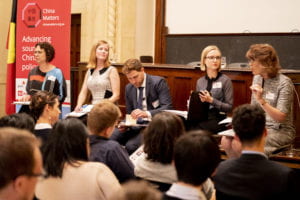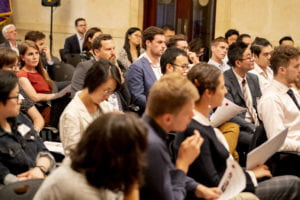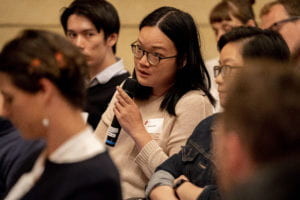 In the decade since the Global Financial Crisis, Australia’s engagement with the People’s Republic of China has continued to expand and while the commercial relationship is complimentary and robust, public discourse regarding political interference and security concerns continue to run counter to this unfettered optimism.
In the decade since the Global Financial Crisis, Australia’s engagement with the People’s Republic of China has continued to expand and while the commercial relationship is complimentary and robust, public discourse regarding political interference and security concerns continue to run counter to this unfettered optimism.
The Australian public has more recently been exposed to headlines regarding visa cancellations for academics attempting to complete field research in Xinjiang; concerns of scientific collaboration being too obscure and leading to gains for Beijing’s opaque security apparatus; and the detainment of Chongyu Feng, Associate Professor of Chinese Studies at the University of Technology Sydney (UTS).
It is against this backdrop that China Matters hosted its 6thYoung Professional debate. The topic, ‘Does the People’s Republic of China pose a threat to academic freedom in Australia?’
China Matters is a local think tank, established to stimulate a realistic and nuanced discussion of the PRC among Australian business, government and the security establishment, and to advance sound policy. Part of the organization’s efforts rest in bringing young professionals into the discussion. Each year, China Matters hosts youth policy forums, debates, and publishes articles from young China watchers.
On December 5, 2018, NYU Sydney collaborated with China Matters by hosting the 6th debate in the series. These debates bring together two young professionals and two special guests to debate topics that are key to the Australia-China relationship. The format is geared at providing stimulating discussion that spans generations, levels of experience, backgrounds and competencies.
The two special guest debaters for the evening were Dr Jane Golley, Acting Director, Australian Centre on China in the World, ANU, and Ms Geraldine Doogue AO, ABC Broadcaster. The young professionals participants were Ms Simone van Nieuwenhuizen, Project and Research Officer, Australia-China Relations Institute, and Ms Belinda McEniery, Health Economics Associate, Johnson & Johnson. The debate was moderated by Mr Dirk Van der Kley, PhD Candidate, ANU.
 The debate started strong with Dr. Golley insisting that anecdote and statistics play a key role in separating fact from fiction. Golley revealed five separate instances in detail regarding visa and book publication deal cancellations, and anecdotes of joint collaboration for publication in journals whereby content had been altered in the editing process in order to reach publishers’ requests for a softer tone. The punchline– they were all personal anecdotes.
The debate started strong with Dr. Golley insisting that anecdote and statistics play a key role in separating fact from fiction. Golley revealed five separate instances in detail regarding visa and book publication deal cancellations, and anecdotes of joint collaboration for publication in journals whereby content had been altered in the editing process in order to reach publishers’ requests for a softer tone. The punchline– they were all personal anecdotes.
Simone van Nieuwenhuizen from the Australia-China Relations Institute at UTS did well to rebut these points while simultaneously bringing to light more factual recounts regarding media stories of detained academics from her own institution. At the heart of her argument for the negative team was her insistence that there was no real threat, the academic relationship is strong and the media have led to a misrepresentation of relations.
Belinda McEniery, Health Economics Associate, Johnson & Johnson then discussed the topic from an economic and policy perspective, arguing that the PRC has so many policy levers that simply leave Australia too vulnerable. McEniery spoke more broadly of political interference citing recent cases in Federal politics to exhibit the breadth of the issue.
The final speaker was one of Australia’s most loved journalists, Ms Geraldine Doogue AO, ABC Broadcaster. Doogue again attempted to argue that public opinion had been too heavily tainted by media headlines. Doogue spoke of the impact of these developments on Chinese students studying in Australia, and argued that there are deeper aspects to the story that need more attention. She again rebutted the affirmative team by assuring the audience that our institutions are more robust than we might think. And this, she closed with, is the most important thing to remember when we are considering threats. Threats are only threats when we fail to mitigate them.
 The event concluded with a robust Q&A where members of the audience were able to interact with the panel, seeking their expertise on the topics discussed. Once all questions had been fielded, the moderator, Louisa Bochner of China Matters asked the audience to vote for the winning team. The affirmative team of Dr Jane Golley and Belinda McEniery won with a count of 44-32.
The event concluded with a robust Q&A where members of the audience were able to interact with the panel, seeking their expertise on the topics discussed. Once all questions had been fielded, the moderator, Louisa Bochner of China Matters asked the audience to vote for the winning team. The affirmative team of Dr Jane Golley and Belinda McEniery won with a count of 44-32.
After the event the crowd broke out into NYU Sydney’s Edgeworth David room for catering and refreshments. Sydney students and guests were able to talk to the panel one-to-one to discuss the debate in more detail.
NYU Sydney was also proud to host John McCarthy, Senior Advisor to Mitsubishi Materials Corporation in Tokyo, and the Chair of the Advisory Board of the Griffith Asia Institute; Stephen FitzGerald, adviser to former Prime Minister Gough Whitlam, and Australia’s first ambassador to the People’s Republic of China; Jocelyn Chey, founding Director of the Australia-China Institute for Arts and Culture, Western Sydney University 2016-17; and Laurie Smith, member of the national board of the Australia China Business Council and Executive Director of International at Austrade 2011-2015.